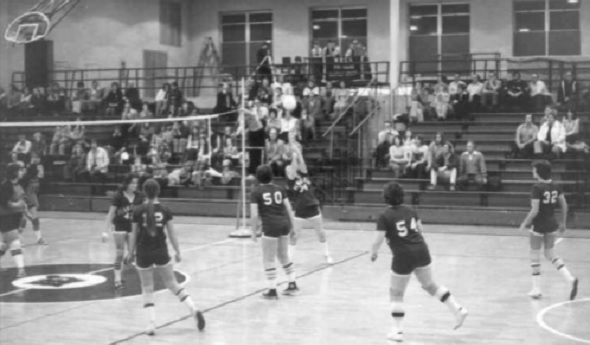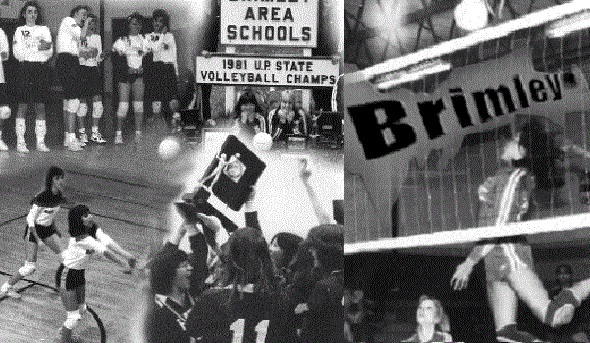
#TBT: MHSAA Hosts 1st Volleyball Finals
September 7, 2017
By Geoff Kimmerly
Second Half editor
Girls volleyball has seen its share of changes over more than four decades as an MHSAA sport – its season moving from winter to fall and the addition to rally scoring in 2005-06 surely would be counted as the most significant.
Along the way, it has become the most popular high school girls sport in the state in terms of participation, with more than 19,000 athletes taking part last season.
The legacy will continue later this season when the MHSAA crowns its 42nd class of champions in the sport. Here’s a look back at the first championship day in 1976, written by MHSAA historian Ron Pesch for a “Finals Flashbacks” published in the 2006 MHSAA Finals program:
The sport of volleyball was invented in 1895 at Springfield College in Holyoke, Massachusetts. Added to the Olympics in 1964, the international amateur athletic event exposed the power game to a broad audience.
In the winter of 1976, the MHSAA added volleyball to the array of championships sponsored by the organization. A total of 458 teams participated in the first volleyball tournament. Broken into three classifications, Class A contests were played on the campus of Schoolcraft College in Livonia, while Class B games were held at Read Field House at Western Michigan University in Kalamazoo. Bay City’s Delta College played host to the Class C-D tournament.
Eight teams qualified for the finals in each classification. Quarterfinal, Semifinal and Final matches were played on the same day, made possible because games were timed during that first year.
Dearborn Fordson had won a non-MHSAA tournament in 1975, and led by tri-captains Lynn March, June Scott and Joan Ferguson, the Tractors earned the MHSAA’s first Class A title by disposing of Grosse Pointe North in the Semifinals, 15-6, 15-4. Fordson then knocked off previously unbeaten Ferndale in the Final, 15-13, 15-5 for the crown.
Parchment carried a nine-player roster, including five seniors, into the first Class B tournament. The Panthers thumped Sturgis, 15-0, 15-8 in the Semifinals, then downed Tecumseh, 15-8, 15-11, to finish the year with a 30-3 record.
Undefeated Flint Holy Rosary, led by coach Jo Lake, rolled to the 1976 Class C-D crown with a 14-5, 13-8 win over Kalamazoo Christian in the Final. The team snagged the Class D title the following year as well, establishing a winning streak of 92 straight matches.
PHOTO: Michigan high school volleyball teams compete during the early days of the sport in this state. (MHSAA file photo.)

#TBT: Brimley Makes Name as UP Power
October 26, 2017
By Geoff Kimmerly
Second Half editor
Girls Volleyball Districts begin Monday, providing another generation the opportunity to become "Legends of the Games."
The MHSAA during the late 1990s and early 2000s honored past champions at the Finals as exactly that – and for today's #TBT we'll recall our 2000 volleyball honoree, Brimley, which was recognized the season the MHSAA's Finals became unified after formerly having separate tournaments for each peninsula.
Below is the piece that ran in the souvenir program celebrating the Bays' dynasty.
It was a legitimate question – "Where's Brimley?"
It had been a long time since the little town located off Whitefish Bay in the Upper Peninsula had made some noise on the statewide level with its school's sports success – not since back-to-back Class D MHSAA Boys Basketball crowns in 1950 and 1951.
It was 1978, and the growth of girls sports saw the birth of a volleyball team at Brimley. Charles Compo took on the coaching reins with very little experience in the sport, but with an eagerness to learn and to teach.
It was the start of something big.
Just two years later, the first MHSAA Upper Peninsula Girls Volleyball Tournament took place, won, somewhat predictably, by a bigger school. Class C St. Ignace took the measure of Bessemer in that first tournament, but what happened next gave a whole new meaning to the phrase "U.P. Power."
Over the next decade, Brimley established itself as the first volleyball dynasty in the Upper Peninsula, and in fact, raised its game to where it was occasionally the top-ranked team statewide in Class D in the coaches polls.
With open-class U.P. championships in 1981, 1982, 1983, 1984, 1985, 1987, 1988, and the first U.P. Class D title in 1991, Brimley earned its spot as one of the Legends of the Games.
But to earn that spot in U.P. and volleyball lore, the Bays had to travel – and oh, did they travel.
"We did a lot of traveling," Compo said. "That's where the competition was. It helped our program get statewide recognition."
Located just off I-75, the Bays went southbound weekend after weekend to face Lower Peninsula competition, which had been playing the game longer. It didn't take long for Brimley to become established as a force to be reckoned with.
"Being from the U.P., we traveled many, many hours on a bus. On those long trips, our teams became very close and developed lasting bonds," said Laura Compo, a setter on the team from 1985 to 1988. "When we arrived at some tournaments, many people wondered where Brimley was; they had never heard of us. Some would even laugh out loud about playing a Class D team from the U.P. More often than not, they wouldn't forget us at the end of a match and tournament. It was very rewarding to make our mark on Michigan volleyball."
While the road to success included long trips, it was an opponent of a relatively short drive away that was Brimley's largest hurdle in its rise to the top. Knocking off the first tournament champion, St. Ignace, was not an easy task.
"The St. Ignace team had beaten us every other time we had met over the previous three seasons and had our number," said Laura Newland, a setter on Compo's first three teams. "They looked like giants, they acted cocky and had a confidence about them that made our team feel like we didn't belong in the same gymnasium with them."
The breakthrough match was in the regional tournament that year, where the Bays finally defeated the Saints in three games to advance to the final level of the tournament.
"That game, the excitement of the fans, the near perfect game both sides played will always be the championship for me – it was one of the greatest experiences of my life," Newland said.
"The first time we defeated St. Ignace, everyone in the stands were on their feet. Some of the dads were crying," said Robin Burton, a setter on the team from 1980 to 1982. "It was the turning point for the team.”
Brimley took the U.P. title a week later by defeating Watersmeet. A team made up of three seniors, four sophomores and four juniors was poised for more success. "We should be better next year, we really should," said Compo after the first title.
Four more titles ensued, with back-to-back wins over Ironwood in 1982 and 1983 and Bessemer in 1984 and 1985. Sault Ste. Marie broke the first streak in 1986 by representing the Eastern U.P. in the finals and claiming the championship, but Brimley's last two Open Class titles came in 1987 and 1988. Two years later, Compo retired from coaching after compiling a 12-year record of 408-74. The next year, the U.P. tournament was broken into classes, and Brimley, directed by Coach Walter Hyvarinen, won the first Class D title.
The Brimley players remember Coach Compo.
"My fondest memory of the team is of Coach Compo," said Burton. "He was a motivator and made working hard fun. He gave much of his time to volleyball – not just practices and games – but in-between – finding new ways to improve our skills and getting us into tournaments all over the state. We wouldn't have been nearly as successful without his extra efforts."
"I remember all the hard work we put into practices and games. We had so much fun, we felt like one big family," said Sherri Carrick, an outside hitter from 1984-87. "Mr. Compo was such a great coach and person that only he could push me to be the player that I was."
Legends in high school sports are about teams that build up their communities, and for the decade of the 1980's, it happened in Brimley. It provided lifetime memories for a team that still makes those who took part feel every bit as proud today as they did while in the school's uniform.
"I remember that pride the most," said Barb Cameron, a middle hitter on the 1985-88 teams. "That, and the shared desire to win against all odds. People would say, 'Where's Brimley?' And we showed them!"

